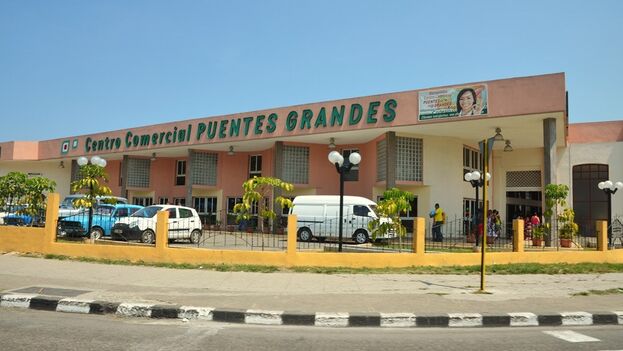
![]() 14ymedio Yoani Sánchez, Havana, 14 April 2020 – For days, Reinaldo had been planning an excursion to the store on the corner of 26th and 51st, near our house. At the first attempt, a neighbor warned us that the line stretched for several blocks; the second time we had to stay home because the water was turned on and we needed to store as much as possible, and the third time we preferred to buy some supplies from an informal vendor. Today, we learned that that state market has become a focus of Covid-19 contagion.
14ymedio Yoani Sánchez, Havana, 14 April 2020 – For days, Reinaldo had been planning an excursion to the store on the corner of 26th and 51st, near our house. At the first attempt, a neighbor warned us that the line stretched for several blocks; the second time we had to stay home because the water was turned on and we needed to store as much as possible, and the third time we preferred to buy some supplies from an informal vendor. Today, we learned that that state market has become a focus of Covid-19 contagion.
Dr. Yadira Olivera Nodarse, director of the Provincial Center for Hygiene, Epidemiology and Microbiology, told the official press that 18 positive cases of the disease were detected around the premises. Now they are looking for anyone who has been there in recent days, and are planning to use surveys to find them, as well as “even reviewing the images from the security cameras,” she clarifies.
It’s a rare day when we don’t hear about someone in Cuba who is under observation or infected by the pandemic. While official figures insist that so far there have been 21 deaths from Covid-19 and 766 confirmed cases, the disease seems to emerge from every corner. Between doubt about government data, the rumor that always adds several layers of exaggeration to reality, and speculation, we tread doubtful territory.
But we not only suppose, but also forget. These days, for example, we should be remembering the 40 years years since the exodus, the Mariel Boatlift, an open wound in Cuban memory. But the coronavirus has taken away even our memories. I was five years old and the Mariel crisis is the earliest image from my mind as a child. The commotion in the tenement where I lived, the adults calling and telling us to get inside, and outside the act of repudiation against two neighbors who decided to leave the Island.
Many believe that children don’t understand it, that they are present without being aware at those moments, but the truth is that children’s eyes grasp traumatic events with extreme sharpness and in their own way. So it is for me, where the wounds of 1980 remain and also the questions. I had to live the rest of my childhood between the two camps, those who talked about the “scum” and the “worms,” and those who compulsively tried to communicate with their emigrated family members so that they could send them something.
After that, I spent long nights dialing the phone number of a relative who had gone to Miami for my mother to ask for some vitamins. They were the old dial phones, there was no redial then, so communicating with the operator who established the “collect call” – paid for by the relatives in Miami – was difficult. I bragged about being fast, my finger spun the dial over and over, and my index finger became darker and darker from rubbing against the bakelite of the device. My finger ended up black and the supplements never came.
My cousin who was a medical student was not allowed to leave in that exodus and was punished for trying with long years in island seclusion. He did not managed to graduate as a doctor but, although his entire family emigrated, the penalty was sending him to work long shifts at the General Freyre de Andrade Clinical Surgical Hospital in Centro Habana, better known popularly as “megencias.” There he lost his sanity and his most joyous years without being allowed to cross the border. Now, 2020 would be the year to revisit all that.
So that 1980 marked us all. Those who were aware, those who weren’t even three feet tall, and those who called us to hatred from the rostrum. Even for the latter, it was never the same, because it was shown that there were a large number of Cubans willing to leave everything behind and face repudiation rallies in order not to follow the official script. It was a year of fractures and, four decades later, 2020 does not bode well for repairs.
I am at home, I already feel better after a few days of physical discomfort. Our new little female puppy has destroyed several shoes, the onion planted in our small balcony garden has sprouted, we save every drop of water and we limit our going out. There is time for reflection, love, projects and remembering. Many details again come to mind, like that girl in the middle of a lot in Central Havana who did not understand the screaming and hitting. I was puzzled and confused then; and now as well.
See other posts in this series.
_______________
COLLABORATE WITH OUR WORK: In this time of Covid-19 crisis, 14ymedio could really use your help to keep the news coming. Please click on this link to support our work.
